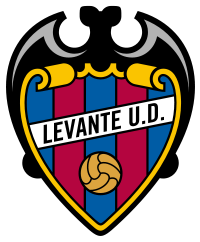

Levante Union Deportiva, S.A.D. , Valencian: Llevant Unio
Esportiva is a Spanish football club based in Valencia, in
the namesake community. Founded on 9 September 1909, it plays in
La Liga, holding home games at Ciutat de València.
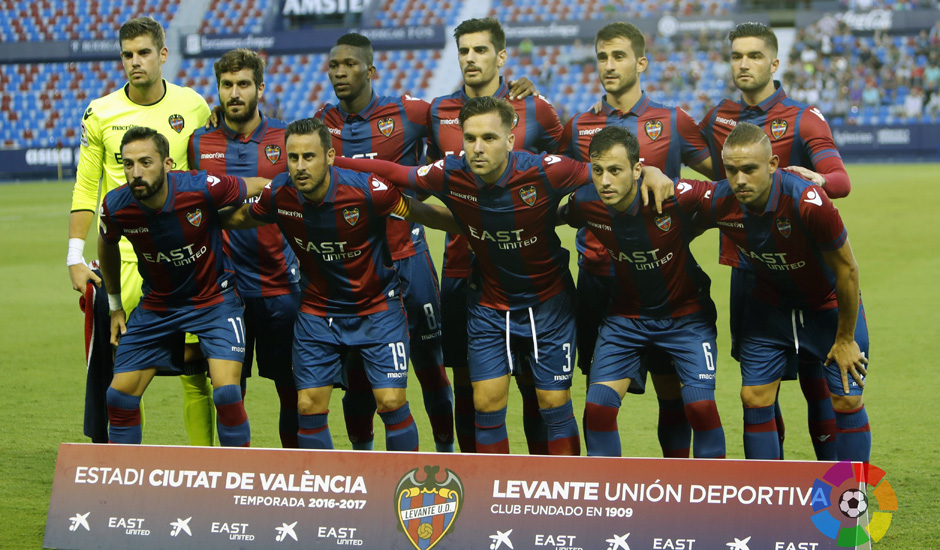
Club: Levante UD | Opening: 1969 | Capacity: 25,352 seats
Estadi Ciutat de València was built as a replacement for Levante’s
old Estadio de Vallejo. First plans were made in the late 1950s,
but it took over ten years for plans to get approved and
construction to start.Estadi Ciutat de Valencia officially opened
on 9 September 1969 with a friendly between Levante and Valencia,
won by the visitors.
The stadium was originally called Estadio Antonio Román, in honour
of the club President at that time, and counted with a capacity of
30,000. In the next years the stadium first changed names to Nou
Estadi, and later to its current name in order to reinforce the
bond of the club with the city.Few changes have been made to the
stadium since
its inauguration, though capacity has slightly declined due to
safety measures.
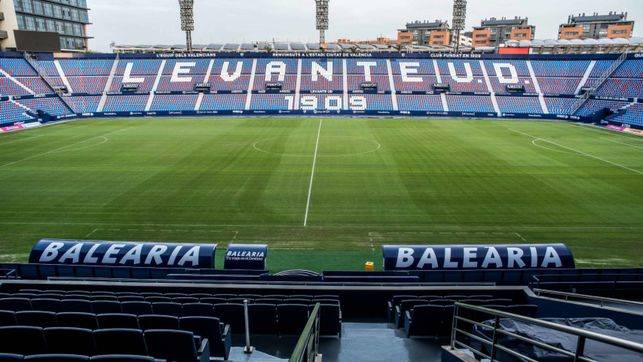
How to get to Estadi Ciutat de Valencia
Estadi Ciutat de Valencia is located toward the north-east of the
city of Valencia at about 2.5 kilometres from the historic city
centre and one kilometre more from the main railway station. The
walk from Valencia’s cathedral to the stadium will take about 30
minutes. Alternatively, there are various ways to get to the
stadium by public transport.
From the railway station you can take metro line 3 (red) to get to
the stadium. Take the metro from, for example, stop Xativa, Colon,
or Alameda in the direction of Rafelbunyol, and get off at stop
Machado. The ride won’t take more than 10 minutes, and it is a
further 5-minute walk from the metro to the stadium.
An alternative is bus 70. Take the bus at Pl. de Ajuntament, Palau
de Justicia, or from the former Turia riverbed, and get off at
stop Alfahuir – Cercle de Belles Arts. Buses go at least every 20
minutes. Bus 11 can be taken from the same points. Get off at stop
Santiago Rusinol.
Tram 6 stops right in front of the stadium (stop Estadi del
Llevant), but only connects with destinations in the eastern part
of the city and around the Mediterranean coast.If arriving by car
from the Autovia V-21/E15 (north-east), take the Ronda Nord
(northern ring road) at entering the city. Follow until you see
the stadium on the left side
of the road.If entering the city from southern or western
direction, follow the signs for Ronda Nord, and follow the Ronda
Nord until you see the stadium on your right.
Levante UD was formerly registered as Levante Football Club on 9
Sep 1909 (but the club celebrated its 100th anniversary on 9 Sep
2009), taking its name from the Levante beach in La Malvarrosa,
and was one of the pioneering football clubs in Valencia. Local
rivals Valencia CF was not formed until 1919, however another
club, Cabanyal FC, had been playing in the city since 1907.
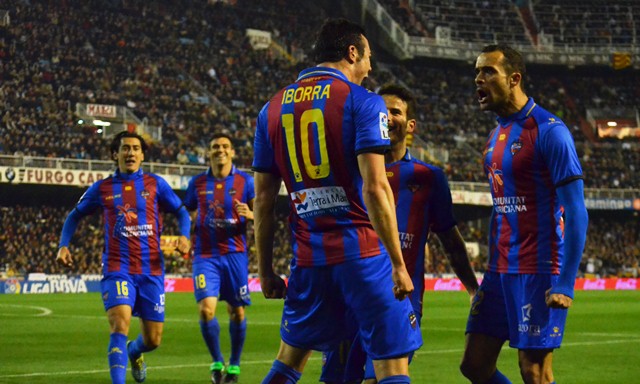
Levante's earliest games were played at La Platjeta, near the
docks on a plot of land owned by a perfume entrepreneur. Its next
ground was also near the port area, and the club gradually began
to become associated with the working class. In 1919, the side
played Valencia CF for the first time, losing 0–1; the game marked
the inauguration of the recently formed new ground at Algirós. In
1928, Levante FC won its first trophy, the Valencian Championship.
1909 also saw the birth of Gimnástico Football Club, which
originally played at Patronato de la Juventud Obrera, being then
named Gimnástico-Patronato. In 1919, Gimnástico became the
champion of the Campeonato de Valencia, beating CD Castellón in
two leg finals; the next year, the club had become Real Gimnástico
Football Club, after being granted royal patronage by Alfonso
XIII, and they reached the final of Campeonato Regional de
Levante, but lost to Club Deportivo Aguileño. In 1931, with the
emergence of the Second Spanish Republic, the club dropped the
Real from its name.
In 1934–35, both Levante and Gimnástico debuted in the second
division, when the league was expanded from 10 teams to 24. In
1935, Levante won the Campeonato Levante-Sur, a competition that
featured teams from Valencia, Murcia and Andalusia, and
subsequently reached the semi-finals of the Spanish Cup,
consecutively
beating Valencia and Barcelona before losing to eventual
runners-up Sabadell.
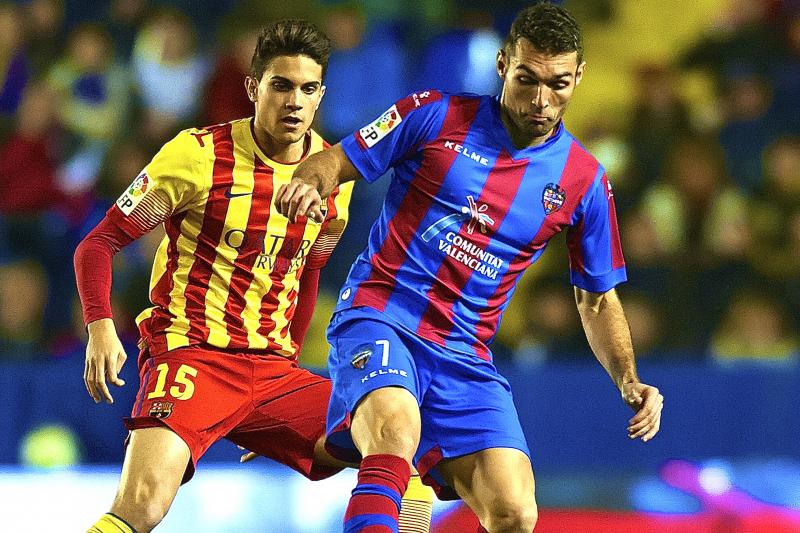
During the Spanish Civil War, Levante and Gimnástico played in the
Mediterranean League, finishing fifth and sixth respectively
– teams from this league also competed in the Copa de la España
Libre ("Free Spain Cup"). It was originally intended that the top
four teams from the league would enter the cup, but Barcelona
opted
to tour Mexico and the United States, and as a result, Levante
took its place.The first round of the competition was a
mini-league with the top two teams, Levante and Valencia,
qualifying for the final. On 18 July 1937, Levante defeated its
city rivals 1–0 at the Montjuïc.
During the Civil War, Levante's ground was destroyed, but the
club's squad remained intact. In contrast, Gimnástico had a
ground, Estadio de Vallejo, but had lost most of their players. As
a result, the two clubs merged in 1939 to become Unión Deportiva
Levante-Gimnástico, changing two years later to Levante Unión
Deportiva, which club
colors in the 2000s also dating from this era (the blaugrana home
colours were originally those of Gimnástico, while the black and
white away kit, was also used by Levante in the beginning).
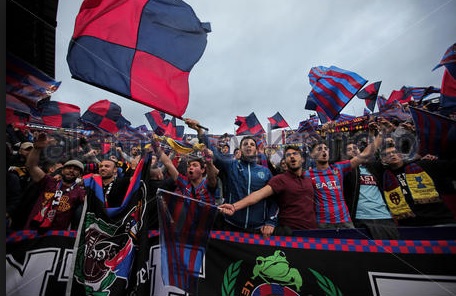
Levante had to wait until the 1960s to make its La Liga debut. In
1963, the club finished runner-up in Group II of the second
division, defeating Deportivo de La Coruña 4–2 on aggregate in the
promotion play-offs. During the first top flight season, it
managed to win both games against Valencia, managing a 5–1 home
win against Barcelona in the
1964–65 campaign but being relegated nonetheless after losing in
the playoffs against Málaga. It spent most of the following two
decades in the second and third divisions; the Segunda División B
would not be created until 1977. In the early 1980s, Dutch
superstar Johan Cruyff played half a season for the club, retiring
three years later.
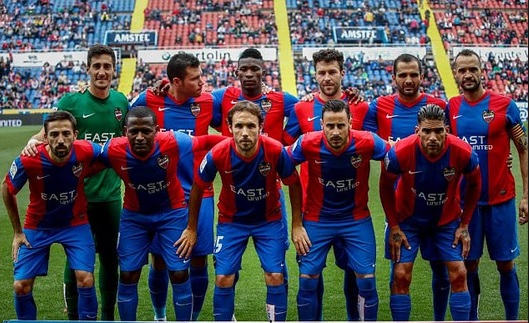
After winning 2003–04's second division, Levante returned to the
top level but survived only one season. Finishing third in
2005–06, it returned for two additional campaigns, the decisive
match in the 2006–07 season being a 4–2 home win against Valencia
courtesy of Riga Mustapha (two goals), Salva and Laurent
Courtois.Levante's financial status worsened, however, and there
were reports that the players had only received approximately
one-fifth of their contractual payments. News reports stated that
the club had incurred a debt of over €18 million in payments due
to its players. The team plummeted down the standings, and it was
confirmed that the club would be playing in the second division in
2008–09, with several matches to go.
The players protested at their lack of payments at one point,
refusing to move for several seconds after the opening whistle
against Deportivo and later announcing that they would issue a job
action during the season-ending game at Real Madrid. The action
was resolved when league officials announced that a benefit game
would be played between Levante team members, and a team made up
of players from the first division, with all benefits going to pay
the wages due to the players.On 13 June 2010, Levante returned to
La Liga after a 3–1 home win against already relegated Castellón.
It lost in the final round 0–4 at Real Betis, but its opponents
only managed to finish with the same points as fourth.
Under the manager who led the team back to the top flight, Luis
García Plaza, Levante finally retained its division status in the
2010–11 season. During one point of the league's second round of
matches, Levante was in third position in the Liga table, only
behind Barcelona and Real Madrid after losing just once in 12
games, against Real Madrid. On 26 October 2011, during round nine
of the season, Levante defeated Real Sociedad 3–2 to move top of
the table with 23 points.It was the first time in the club's
history it reached the highest ranking in the top division.
The Levante squad honours the Virgen de los Desamparados
Levante UD squad made the traditional floral offering to the
Virgen de los Desamparados in the Basilica prior to the start of
the 2017-2018 La Liga competition, scheduled for next Monday at
8.15pm with the clash that will size up Levante and Villarreal in
the Ciutat de València Stadium. Quico Catalán, Club Chairman, Paco
Fenollosa, Honorary Chairman, and López Muñiz, Head Coach, led the
Levante players in a classic act during the summer period. Pedro
López, captain of the first team, and Quico Catalán headed towards
the city’s patron, appealing for protection from the toughness of
the coming year. This event concluded with the usual family photo
that brought together the players, coaches and members of the
Board of Directors gathered together in the Basilica.
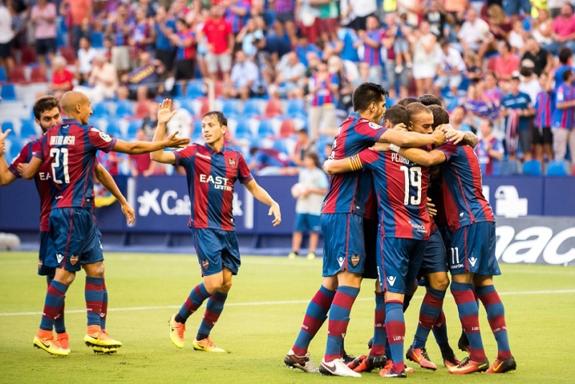
Levante vs Eibar , match information & kick-off time
If Levante can beat Eibar on Friday night in Spain, the
relegation battle in La Liga could record a pivotal moment.Levante
come into the Eibar game fourth bottom and four points clear of
the bottom three.With third bottom Las Palmas facing off at
second-bottom Deportivo La Coruna on Saturday, Levante have the
opportunity to make a
huge statement in their bid for survival.
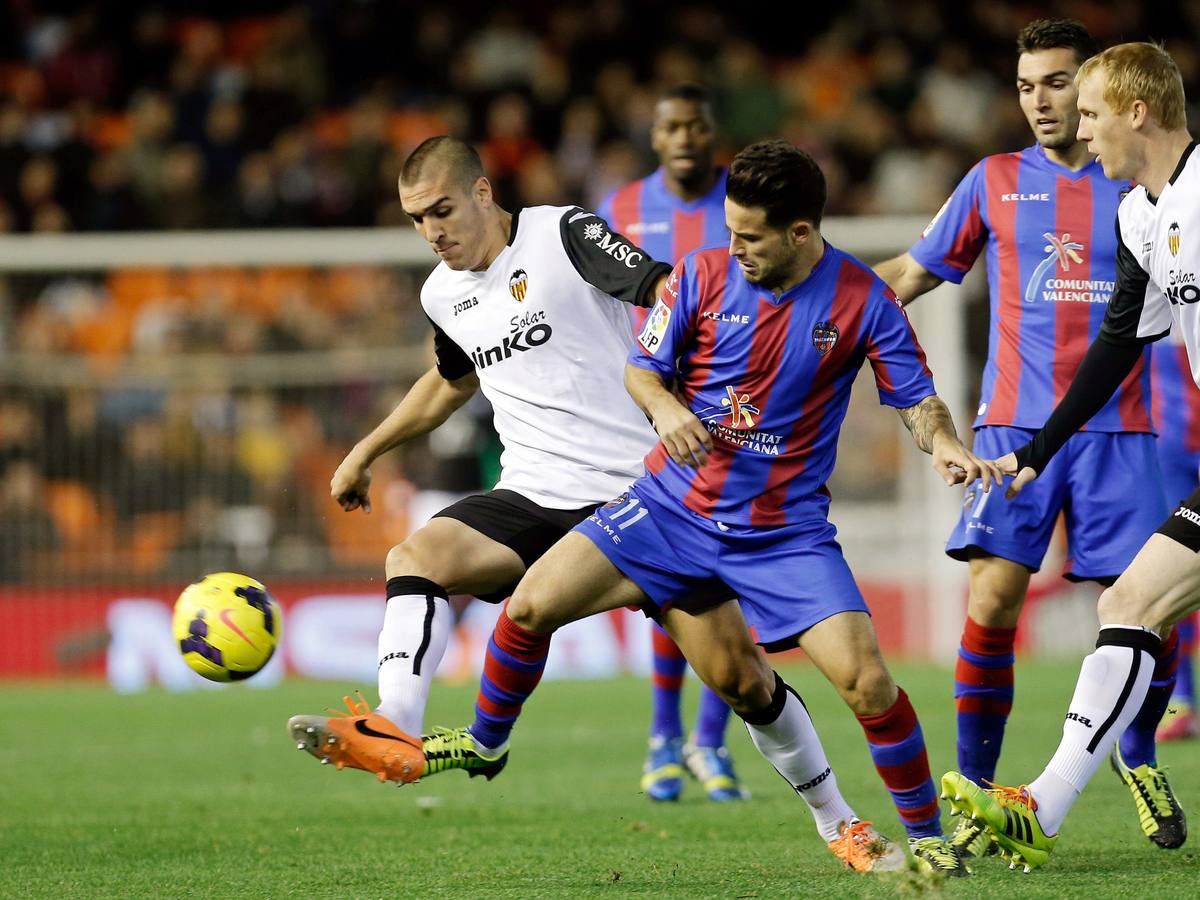
And Levante will feel confident about their chances of claiming
the home win following last weekend’s 1-0 victory at Getafe. Eibar
have been one of the surprise teams in the Spanish top flight this
season as they’ve competed in the top half of the table for the
majority of the campaign.But last weekend’s defeat to Real Madrid
saw Eibar drop down to ninth in the division as their season
begins to peter out.
Eibar’s lack of purpose until the close of the campaign is
reflected in their recent results. They have one win, one draw and
three defeats in their last five.Last time they met: Eibar 2 –
Levante 2When the sides met earlier in the season, Eibar
fought back from 2-down for the draw. José Luis Morales opened for
Levante before Enis Bardhi doubled the lead.Goals from Anaitz
Arbilla and Charles in the second half earned Eibar a point.
Juan Ramon Lopez Muñiz has left his role as Levante UD coach. The club announced the decision on Sunday afternoon following a 1-1 draw with RCD Espanyol. Muñiz leaves the side in 17th position in LaLiga Santander and on a 14-game winless streak. The Asturias-born coach took over at the start of last season and led the club back to the top-flight but was unable to replicate the good form that handed Levante the LaLiga 1l2l3 title in 2017.The club have announced that youth team coach Paco Lopez will take Muñiz’s place in the dugout until the end of the season.
Read More : About Transfers, Footballers, fixes, livescores, football betting, Sbobet ( Sbobet.com )